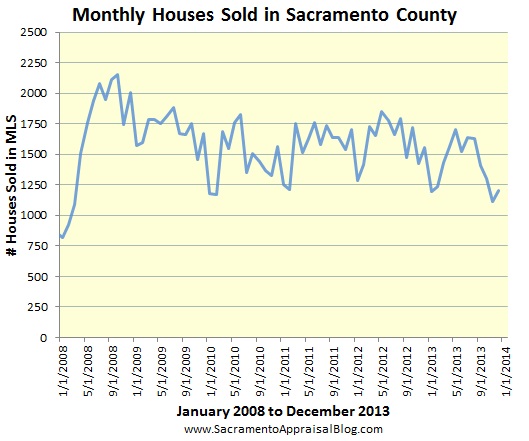It’s time for a panoramic view. Give me a minute to explain and then spend a few moments digesting the images below. If you want to understand the Sacramento real estate market, it’s really helpful to see how certain “layers of the market” work together. These graphs help give context for how price, interest rates, inventory and unemployment mingle. Have a look below to try to make sense of what is happening with each of these metrics at any given time. For instance, when values are increasing, what is happening with interest rates and inventory? Or when values are declining, what is typically happening with unemployment or interest rates? Be sure to check out my detailed market post if you missed it a few days ago. Ultimately, what can we expect in 2014? Enjoy.



Share the Graphs: As always, you can use these images unaltered in your newsletter, on social media sites or blog posts (just link back). See my sharing policy for more details about 5 different ways to share my content.
Questions: Any thoughts? What do you see? I’d love to hear your take.
If you liked this post, subscribe by email (or RSS). Thanks for being here.
 The honeymoon is over. That’s right. The real estate market in 2013 felt like a honeymoon because it was full of glittery optimism, sensational news headlines and the sweet aroma of a quick recovery. Just as a honeymoon in real life comes to an end, we all knew such rapid appreciation was not sustainable, inventory could not be that low forever and interest rates wouldn’t endlessly hover at historically low levels either. Of course this doesn’t mean the market is not still ripe for positive growth, but only that this year probably won’t feel as good as last year.
The honeymoon is over. That’s right. The real estate market in 2013 felt like a honeymoon because it was full of glittery optimism, sensational news headlines and the sweet aroma of a quick recovery. Just as a honeymoon in real life comes to an end, we all knew such rapid appreciation was not sustainable, inventory could not be that low forever and interest rates wouldn’t endlessly hover at historically low levels either. Of course this doesn’t mean the market is not still ripe for positive growth, but only that this year probably won’t feel as good as last year. Housing inventory decreased last month below 2 months of supply, which is understandable in light of the holidays and colder weather. Otherwise inventory has been flirting with 2.5 months. I said above that the real estate “honeymoon” is over, but keep in mind inventory is still very low, which means there is still room for some growth ahead (though I do not believe we will see the same rapid appreciation like we did last year since the market is different this time around in terms of inventory, interest rates and cash investors). The median price in December saw a slight uptick from November, but overall is still hovering around the $250,000 range as it has been for about six months. Can you see why people are saying the market is flat?
Housing inventory decreased last month below 2 months of supply, which is understandable in light of the holidays and colder weather. Otherwise inventory has been flirting with 2.5 months. I said above that the real estate “honeymoon” is over, but keep in mind inventory is still very low, which means there is still room for some growth ahead (though I do not believe we will see the same rapid appreciation like we did last year since the market is different this time around in terms of inventory, interest rates and cash investors). The median price in December saw a slight uptick from November, but overall is still hovering around the $250,000 range as it has been for about six months. Can you see why people are saying the market is flat? Here is a broader picture of median price and inventory. Current values are tending to resemble values in both 2003 and 2007/2008.
Here is a broader picture of median price and inventory. Current values are tending to resemble values in both 2003 and 2007/2008. Sales were sparse for the
Sales were sparse for the 
 The jobless rate is thankfully going down in Sacramento County, but 8.1% is still not a pretty statistic. Can I be a resounding gong by saying we need more JOBS, JOBS & JOBS?
The jobless rate is thankfully going down in Sacramento County, but 8.1% is still not a pretty statistic. Can I be a resounding gong by saying we need more JOBS, JOBS & JOBS?




 Abbreviate Carbon Monoxide Detector Correctly: If you didn’t know, carbon monoxide detector is shortened to CO – not CO2. If you want some clever ways to remember that, check out
Abbreviate Carbon Monoxide Detector Correctly: If you didn’t know, carbon monoxide detector is shortened to CO – not CO2. If you want some clever ways to remember that, check out  More Listening on Social Media: The
More Listening on Social Media: The 